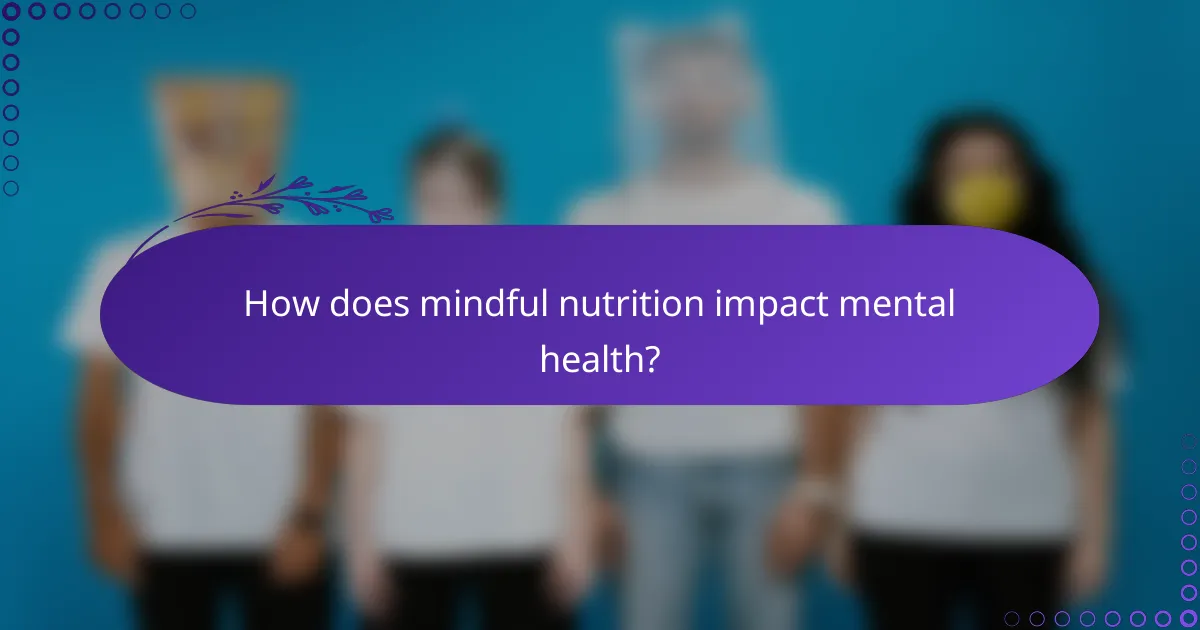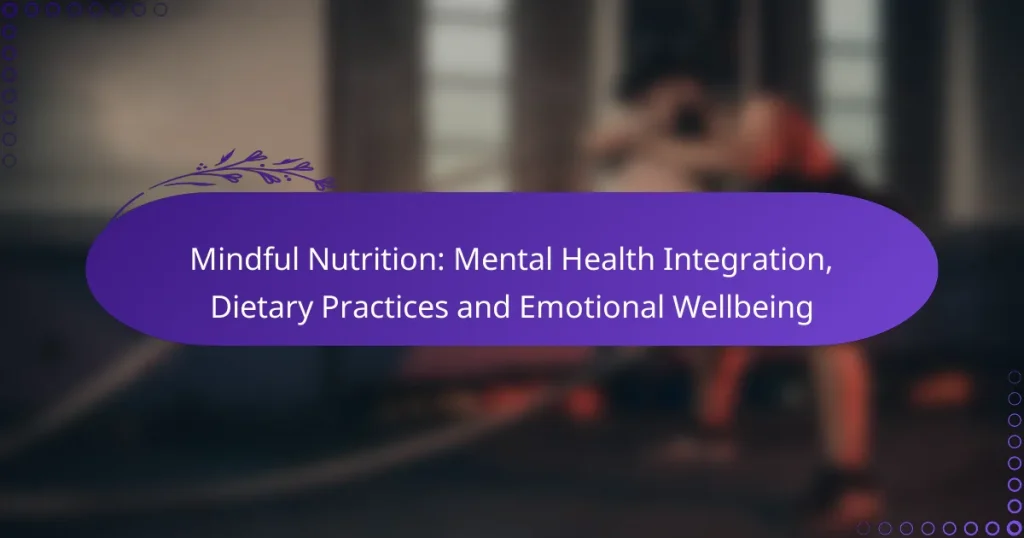Mindful nutrition plays a crucial role in enhancing mental health by creating a strong link between our dietary choices and emotional wellbeing. By consciously selecting nutrient-rich foods and practicing mindful eating, we can significantly improve our mood, reduce anxiety, and foster resilience against stress.

How does mindful nutrition impact mental health?
Mindful nutrition positively influences mental health by fostering a deeper connection between dietary choices and emotional wellbeing. By paying attention to what we eat and how it affects our mood, we can enhance our overall mental state and resilience against stress.
Improves mood stability
Mindful nutrition helps maintain mood stability by promoting a balanced intake of nutrients essential for brain function. Foods rich in omega-3 fatty acids, such as fatty fish and walnuts, can support neurotransmitter production, which is crucial for regulating mood. Incorporating a variety of fruits, vegetables, and whole grains can also provide the vitamins and minerals needed to keep mood swings at bay.
To enhance mood stability, aim to consume a balanced meal every few hours, focusing on complex carbohydrates, proteins, and healthy fats. Avoid excessive sugar and processed foods, which can lead to energy crashes and irritability.
Reduces anxiety symptoms
Mindful nutrition can significantly reduce anxiety symptoms by addressing the physiological aspects of anxiety through diet. Foods high in magnesium, such as leafy greens and nuts, can help calm the nervous system and reduce feelings of anxiety. Additionally, maintaining stable blood sugar levels through regular meals can prevent the spikes and drops that often contribute to anxiety.
Consider incorporating herbal teas, like chamomile or green tea, which have calming properties. Aiming for a diet rich in whole foods while minimizing caffeine and alcohol can also support lower anxiety levels.
Enhances cognitive function
Mindful nutrition enhances cognitive function by providing the brain with essential nutrients that support memory, focus, and overall mental clarity. Antioxidant-rich foods, such as berries and dark chocolate, can protect brain cells from oxidative stress, while foods high in omega-3s are linked to improved cognitive performance.
To boost cognitive function, include a variety of colorful fruits and vegetables in your meals, as they contain different phytonutrients beneficial for brain health. Regular hydration is equally important; aim for adequate water intake throughout the day to support optimal cognitive performance.

What dietary practices promote emotional wellbeing?
Dietary practices that enhance emotional wellbeing focus on nutrient-rich foods that support brain health and mood regulation. Incorporating specific nutrients and mindful eating habits can significantly influence mental health and emotional stability.
Incorporating omega-3 fatty acids
Omega-3 fatty acids are essential fats that play a crucial role in brain function and emotional health. They can be found in fatty fish like salmon, mackerel, and sardines, as well as in flaxseeds and walnuts.
To promote emotional wellbeing, aim for at least two servings of fatty fish per week or consider a high-quality omega-3 supplement if fish consumption is low. Research suggests that adequate omega-3 intake may help reduce symptoms of depression and anxiety.
Utilizing whole foods
Whole foods, such as fruits, vegetables, whole grains, nuts, and seeds, provide vital nutrients that support mental health. These foods are typically high in fiber, vitamins, and minerals, which can enhance mood and cognitive function.
Focus on incorporating a variety of colorful fruits and vegetables into your daily meals. Aiming for at least five servings of fruits and vegetables each day can help ensure a broad spectrum of nutrients that contribute to emotional wellbeing.
Practicing mindful eating
Mindful eating involves paying full attention to the eating experience, which can lead to healthier food choices and improved emotional health. This practice encourages individuals to savor their food, recognize hunger cues, and appreciate the sensory aspects of eating.
To practice mindful eating, try to eliminate distractions during meals, such as screens or multitasking. Take time to chew slowly and enjoy each bite, which can help prevent overeating and promote a positive relationship with food.

What are the best foods for mental health?
The best foods for mental health include a variety of nutrient-dense options that support brain function and emotional wellbeing. Incorporating these foods into your diet can enhance mood, reduce anxiety, and improve overall mental clarity.
Leafy greens and vegetables
Leafy greens, such as spinach, kale, and Swiss chard, are rich in vitamins and minerals that play a crucial role in brain health. These vegetables contain antioxidants and anti-inflammatory properties that can help reduce symptoms of depression and anxiety.
Incorporate a variety of colorful vegetables into your meals to maximize nutrient intake. Aim for at least five servings of vegetables daily, focusing on dark, leafy options to boost your mental health effectively.
Nuts and seeds
Nuts and seeds, including walnuts, almonds, and flaxseeds, are excellent sources of omega-3 fatty acids and magnesium, both of which are linked to improved mood and cognitive function. Regular consumption of these foods can help stabilize emotional health and enhance brain performance.
Consider adding a handful of nuts or a sprinkle of seeds to your daily snacks or salads. Aiming for about 30 grams of mixed nuts or seeds each day can provide beneficial nutrients for mental wellbeing.
Fermented foods
Incorporate fermented foods into your diet several times a week. Start with small servings, such as a cup of yogurt or a few tablespoons of sauerkraut, to reap the benefits without overwhelming your digestive system.

How can I integrate mindfulness into my eating habits?
Integrating mindfulness into your eating habits involves being fully present during meals, which can enhance your awareness of food choices and emotional responses. This practice can lead to healthier eating patterns and improved emotional wellbeing.
Setting a calm eating environment
Creating a calm eating environment is essential for mindful eating. Choose a quiet space free from distractions like television or smartphones, and consider dimming the lights or playing soft music to enhance relaxation. A serene atmosphere helps you focus on your meal and promotes a sense of peace.
Arrange your dining area neatly, using appealing tableware to elevate the experience. Simple touches like fresh flowers or a clean tablecloth can make a significant difference in how you perceive your meal.
Focusing on sensory experiences
Mindful eating encourages you to engage your senses fully. Pay attention to the colors, textures, and aromas of your food before taking a bite. This heightened awareness can enhance your enjoyment and satisfaction, making you less likely to overeat.
As you eat, chew slowly and savor each bite. Notice how the flavors change and how your body responds to different foods. This practice can help you develop a deeper connection with your meals and recognize when you are full.
Practicing gratitude before meals
Taking a moment to express gratitude before meals can shift your mindset and enhance your eating experience. Consider reflecting on the effort that went into preparing your food, from the farmers who grew the ingredients to the cooks who prepared them.
You might also keep a gratitude journal where you note what you appreciate about your meals. This practice can foster a positive relationship with food and encourage healthier choices.

What role does hydration play in mental health?
Hydration is crucial for maintaining mental health, as it directly affects cognitive function and emotional stability. Adequate water intake helps ensure optimal brain performance and supports various psychological processes.
Maintains cognitive performance
Staying properly hydrated is essential for cognitive performance, including memory, attention, and decision-making. Even mild dehydration can lead to difficulties in concentration and increased fatigue, which can hinder daily tasks.
To maintain cognitive function, aim for about 2 to 3 liters of water daily, depending on activity level and climate. Simple strategies like carrying a water bottle or setting reminders can help ensure consistent hydration throughout the day.
Supports emotional regulation
Hydration plays a significant role in emotional regulation by influencing mood and stress levels. Insufficient water intake can lead to irritability and anxiety, making it harder to manage emotions effectively.
To support emotional wellbeing, monitor your hydration status and drink water regularly, especially during stressful situations. Incorporating hydrating foods, such as fruits and vegetables, can also contribute to overall fluid intake and enhance emotional health.

How can I choose the right supplements for mental health?
Choosing the right supplements for mental health involves understanding your specific needs and consulting reliable sources. Key factors include the type of supplement, its dosage, and how it interacts with your overall diet and health conditions.
Consulting with a healthcare professional
Consulting with a healthcare professional is crucial when selecting supplements for mental health. A qualified expert can assess your individual health status, recommend appropriate supplements, and ensure they do not interfere with any medications you may be taking.
During your consultation, be prepared to discuss your mental health history, current symptoms, and any dietary restrictions. This information helps the professional tailor recommendations to your specific needs.
Additionally, consider asking about reputable brands and dosages. Healthcare professionals can guide you on what to look for on labels, such as third-party testing or certifications, which can indicate quality and safety.


